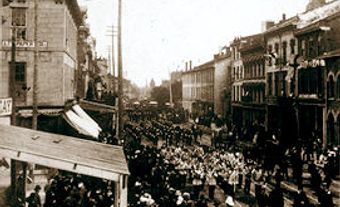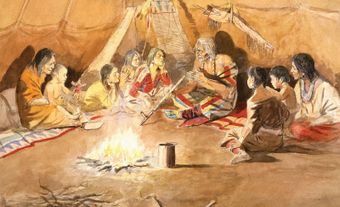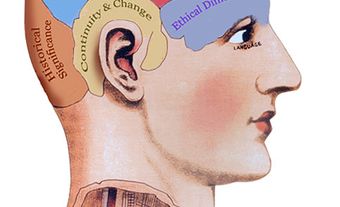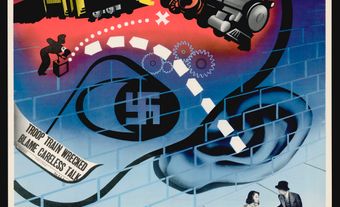Oral history is an account of the past transmitted by word of mouth. It has made important contributions to the ways in which we understand and interpret the past. Today, oral history has become an important field of study. Oral histories are also central to Indigenous cultures, both historical and contemporary. (See also Historical Sources and Indigenous Oral Histories and Primary Sources.)
What Is Oral History?
The Oral History Association defines oral history as a “method of gathering, preserving and interpreting the voices and memories of people, communities, and participants in past events.” It is one of the oldest ways of retelling historical events.
Indigenous Oral Histories
Oral histories play an integral role in Indigenous cultures. Sometimes referred to as oral traditions, oral histories transmit important histories, stories and teachings to new generations. Oral histories let Indigenous peoples teach about their own cultures in their own words. Today, academics, researchers and museum curators use such sources to highlight Indigenous perspectives. (See also Indigenous Oral Histories and Primary Sources.)
Modern Oral History Movement
Allan Nevins of Columbia University, New York, is generally considered to have started the modern oral-history movement. In 1948, he established the Oral History Research Office, which now includes nearly 8,000 taped memoirs and about 1,000,000 pages of transcript.
Oral history projects and studies became increasingly popular in the late 1960s and into the 1970s. Today, there are a variety of academic institutions that provide courses and programs on oral history, as well as organizations that help to preserve and promote oral histories.
Some of the main proponents of oral history in Canada include universities, museums, the media and government archives and agencies. Oral history is not the domain of institutions alone, however. Many individuals and amateur groups have taken up oral history as a hobby.
Did You Know?In the early 1950s, recording oral histories on tape came into general use in North America. The first really portable recording equipment was the Webcor tape machine, which was the size of a suitcase and weighed over 11 kg. By the 1970s, the cassette recorder was small enough to be carried over the shoulder or in a pocket. Oral history in the 1980s and 1990s was a child of the electronic age and, as an organized activity, popular movement or pastime, expanded as recording equipment grew smaller. Since then, the recording and preservation of oral histories have been shaped by the internet and advanced recording technology.
Oral History Interviews
Although oral history includes different forms, includingfolkloreand folk songs (seefolk music), at its centre is the interview. Some interviews are about recording the memoirs of important people. There is also the ordinary-person interview. Accounts of the average person aim to highlight the views and perspectives of those who are often overlooked or undervalued in traditional written histories. For example, these accounts can document the stories of immigrants and minorities, the experiences of survivors of tragedies (such as the Holocaust), the recollections of war veterans, and the stories of the average citizen.
The ordinary-person interview has given a human dimension previously lacking in historical accounts. It has given the silent masses a voice. Furthermore, the experience of hundreds of interviews has shown that the average person is much more frank and forthcoming when speaking, even in the presence of a microphone and recording device, than when writing.
However, good oral history requires much more than a microphone and a willing subject: during interviews, questions must be presented deftly and fairly. If the results are to be published, the interviews need to be subjected to careful, often difficult and sophisticated editing which allows the subject's story to be told in his or her own words, with a minimum of distortion.
Strengths and Weaknesses of Oral History
At the onset of the modern oral history movement, some academics were suspicious of oral history. They argued that people's memories are distorted by time and that memories are rarely devoid of opinion and bias. Therefore, they argued, oral history is frequently unreliable. While today many historians and academics now place greater value on oral history, they still often encourage researchers to check a subject's memories, whenever possible, against documentary sources.
Despite potential issues using oral history, the source remains an important method of recording and understanding history. It enables people to tell their stories in their own words, and to share their perspectives with their contemporaries and generations to come.

 Share on Facebook
Share on Facebook Share on X
Share on X Share by Email
Share by Email Share on Google Classroom
Share on Google Classroom




